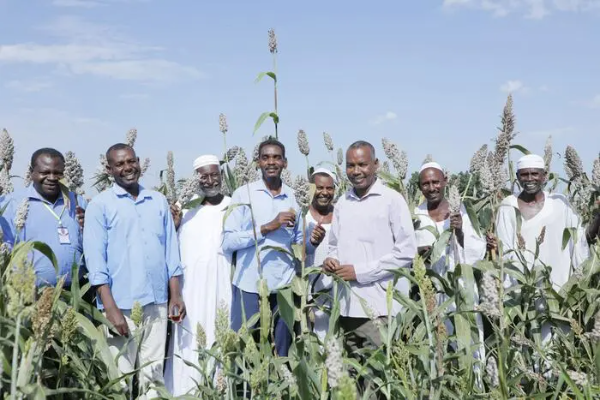
Sudan is poised to make a significant step in its fight against micronutrient deficiencies and food system stress with the upcoming introduction of a new zinc-enriched sorghum variety.
The initiative, spearheaded by HarvestPlus and the International Crops Research Institute for the Semi-Arid Tropics (ICRISAT), represents a promising intersection of agricultural innovation, public health, and climate-adaptive practices.
Biofortification—enhancing the nutrient content of staple crops via breeding—has gained traction globally as a sustainable solution to hidden hunger. The variety at the heart of this effort, ICSR 14001, was initially developed in India. It boasts grain levels of 32 ppm zinc—approximately 50 % higher than standard varieties—and 45 ppm iron while offering improved protein content and reduced phytates, which can inhibit mineral absorption.
Extensive testing in India demonstrated the crop’s robustness: high yields in rainfed conditions, nutrient profiles supportive of immune strength and cognitive function, and cultural acceptability. These traits have informed a blueprint for scaling up across other dryland nations.
Regional Expansion: Saudi Arabia and Sudan
In Saudi Arabia, a similar adoption drive is already underway. Working with FAO and national agricultural bodies, ICRISAT has introduced ICSR 14001—locally named ‘Mojan’—into dryland zones. Trials in Jazan have produced strong grain and fodder yields, and the variety’s dual-purpose use has met with high praise from farmers and officials alike.
Sudan now joins the initiative as a critical next step. Sorghum is deeply ingrained in the Sudanese diet, yet zinc deficiency remains pervasive across the population. Building on India’s success, HarvestPlus is facilitating the introduction and multiplication of ICSR 14001 in agroecologically targeted regions. Early sensory trials of traditional kisra made from the Sudan-adapted line—dubbed ‘Dahab’—have produced extremely positive feedback, with average liking scores of 8 out of 9 and special appreciation for its golden-brown hue, soft texture, and nutty flavor.
Science-Driven Validation
A recently published study in Frontiers in Nutrition involving 100 participants aged 18–75 evaluated kisra made from Dahab. Participants rated the product using a 9‑point hedonic scale and a Rate‑All‑That‑Apply (RATA) methodology. Scores of 8, or “like very much,” were received overall, with sensory attributes—such as color, texture, and flavor—noted as key preference drivers.
This validation is part of a comprehensive ICRISAT case study that describes the collaborative, farmer-centric model underpinning this scale‑up. It emphasizes demand-led breeding, farmer engagement, seed systems development, and coordination with national nutrition policies—a template now being replicated beyond India.
Why This Matters for Sudan
Sudan faces a twin challenge: climate stress undermining food production and widespread micronutrient deficiency threatening public health. The adoption of ICSR 14001 is not just about increasing yields—it’s a strategic public‑health investment. By integrating nutrient-dense sorghum into the food system, farming communities can improve daily zinc and iron intake without relying on supplements or fortified foods, which are often inaccessible or costly.
Moreover, sorghum’s resilience to drought aligns well with Sudan’s environmental realities. The ICRISAT‑HarvestPlus model delivers not only improved varieties but training in best agronomic and seed‑multiplication practices, ensuring that farmers can access quality seed year after year. This enhances local seed autonomy in a region historically dependent on imports.
Scaling Up: Steps Ahead
Implementation in Sudan is tailored to local agro‑ecological zones through partnerships with national CG‑centers. The next phase involves establishing pilot plots, seed multiplication facilities, and extension services to support farmer uptake.
Crucially, success hinges on policy alignment. Sudanese agricultural and nutrition ministries, collaborating with ICRISAT and CGIAR partners, are integrating zinc-biofortified sorghum into national nutrition and food-security strategies—bolstering both agricultural productivity and dietary outcomes.
Global Implications and Horizon
The spread of ICSR 14001 from India to Saudi Arabia and now Sudan reflects a model for global scale: one where resilient, nutrient-enhanced staples drive climate adaptation and health improvement in equal measure. With climate shocks and food insecurity on the rise, such biofortified staples offer a low-cost, culturally acceptable, and scientifically verified means to tackle hidden hunger.
HarvestPlus and ICRISAT intend to deepen engagement with governments, the private sector, and global partners to broaden access to biofortified sorghum and similar crops across dryland regions. The approach underscores SDG 2 (Zero Hunger), SDG 3 (Good Health & Well‑Being), and SDG 13 (Climate Action).
As Sudan embarks on this journey, the country not only inherits a proven solution but contributes a living laboratory for scaling up in challenging environments. Its success could pave the way for broader regional impact—unlocking the potential of zinc-enriched sorghum across East Africa and beyond.







